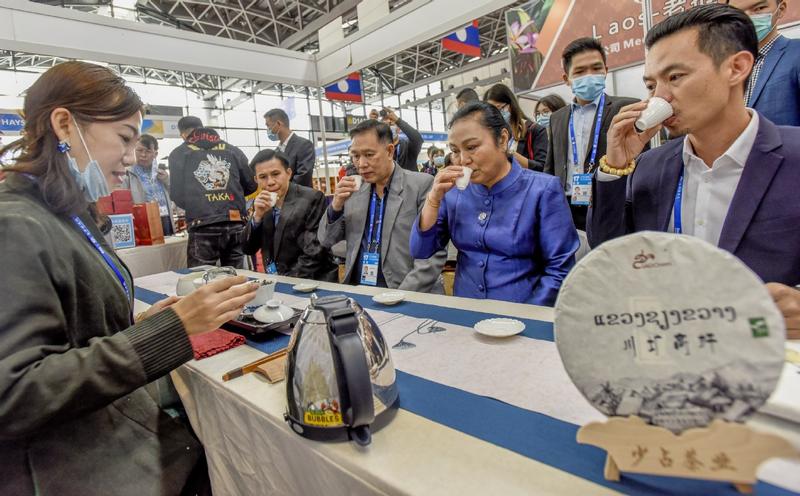 An exhibitor promotes imported goods via livestreaming during the 17th China-ASEAN Expo held in Nanning, Guangxi Zhuang autonomous region, in November. (PHOTO / XINHUA)
An exhibitor promotes imported goods via livestreaming during the 17th China-ASEAN Expo held in Nanning, Guangxi Zhuang autonomous region, in November. (PHOTO / XINHUA)
China and the Association of Southeast Asian Nations (ASEAN) will forge closer economic ties with evolving trade relations and enhanced industrial cooperation this year, an expert said.
"It is expected that ASEAN's share in China's foreign trade will continue to rise in 2021, and two-way investment will also increase, spurred by supportive policies such as the Belt and Road Initiative, the Regional Comprehensive Economic Partnership (RCEP) agreement together with the framework of China-ASEAN Free Trade Area," said Xu Ningning, executive president of the China-ASEAN Business Council.
Covering a population of 2.27 billion and a combined GDP of US$26.2 trillion, the RCEP signatories, including 10 ASEAN member states along with China, Japan, South Korea, Australia and New Zealand, are aiming to form a large integrated market
"Such supportive policies will also help create favorable conditions for industrial cooperation between China and ASEAN member states, which is important for economic development for both sides, especially as cooperation will help form new industry chains within the area with complementary industrial strengths from different countries, and raise global competitiveness," Xu added.
Xu said that for many years, European countries and the United States have been important trade links and industrial chains for both China and ASEAN member states. But now, the COVID-19 pandemic and global economic uncertainties pose great challenges to the global industry chain.
Under such circumstances, Xu said China and ASEAN member states should cooperate to form a relatively complete industry chain to manage risks and achieve long-term development.
ALSO READ: Wang’s visit strengthens ASEAN ties
"More trade and investment opportunities will emerge in natural resources-related industries, the digital economy, services relevant to trade and investment and sectors with weaker positions in the global value chain. Other sectors in which China and ASEAN member states are encouraging investment are also likely to see new business opportunities," Xu said.
"The RCEP agreement will play an important role in forming industry chains within the area and spur more trade and investment opportunities between China and ASEAN member states," Xu said.
The agreement, which is expected to take effect by the end of this year, will promote zero tariffs on about one-third of China's trade, facilitate the opening-up of related services and investment, enhance trade convenience and bolster a better business environment, according to the Ministry of Commerce.
Covering a population of 2.27 billion and a combined GDP of US$26.2 trillion, the RCEP signatories, including 10 ASEAN member states along with China, Japan, South Korea, Australia and New Zealand, are aiming to form a large integrated market.
Last year, despite contracting global trade and economic recession, trade and investment between China and ASEAN have continued to grow. The value of China-ASEAN trade reached 4.74 trillion yuan (US$730 billion) last year, a year-on-year growth of 7 percent, and ASEAN has become China's largest trade partner, according to the General Administration of Customs.
"The growth in China-ASEAN trade and investment showed great potential and vitality of both sides' economic relations," Xu said.
READ MORE: ASEAN defense ministers issue joint declaration on cooperation
Xu said both China and ASEAN have increasing needs to deepen economic relations and promote closer and more active cooperation, which is not only beneficial to both sides but also helps with the stable economic growth of East Asia, as well as global economic recovery.


